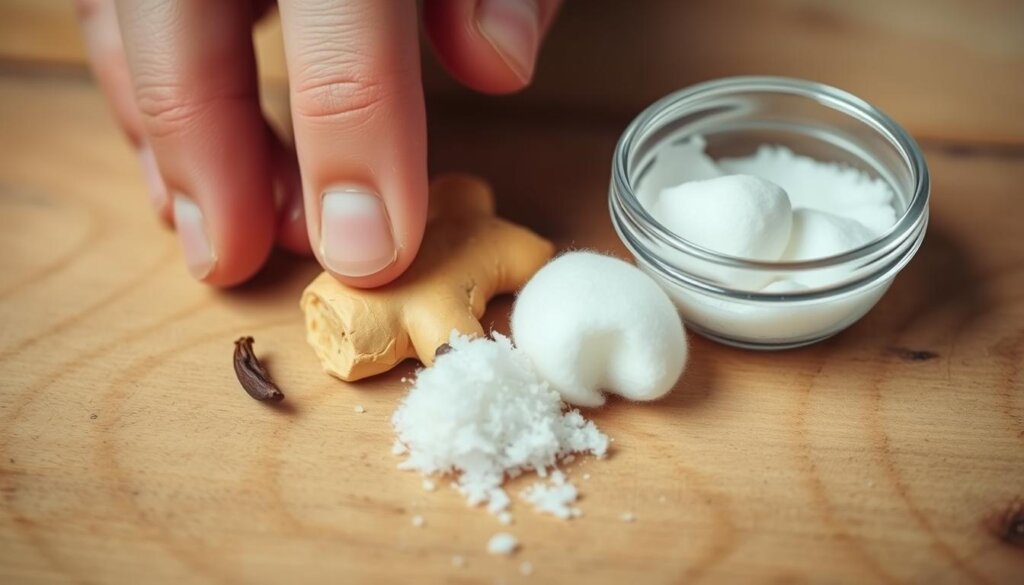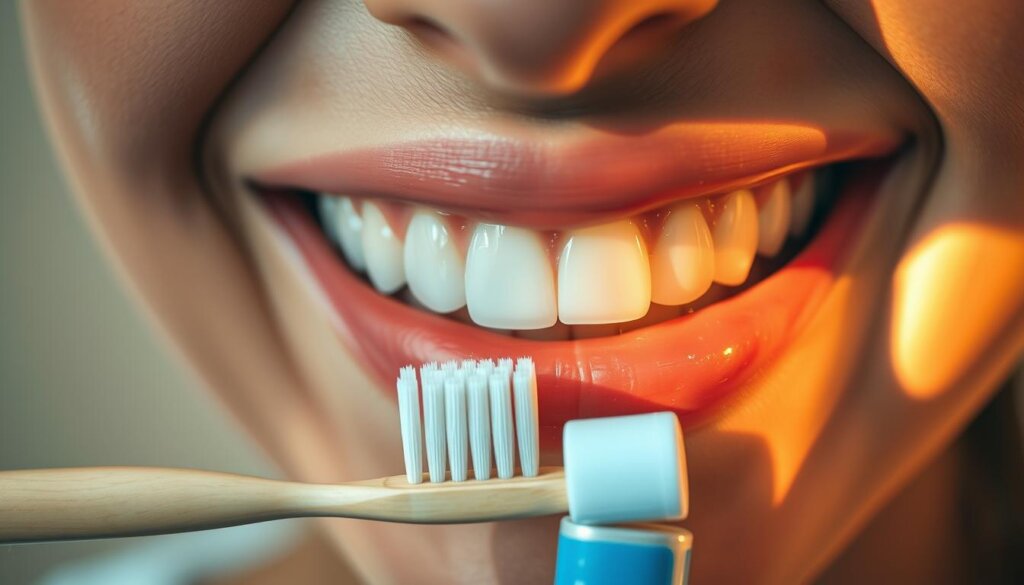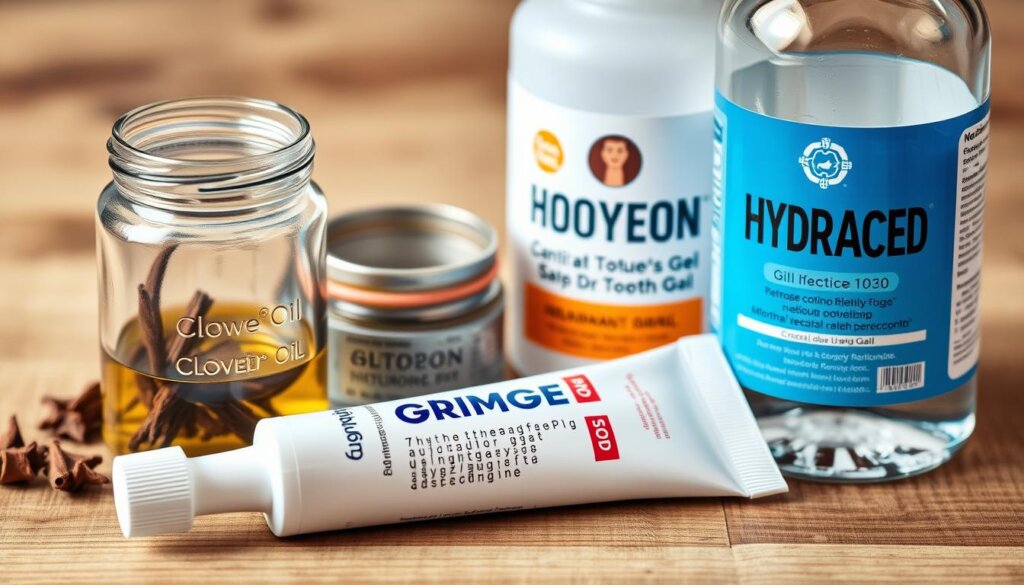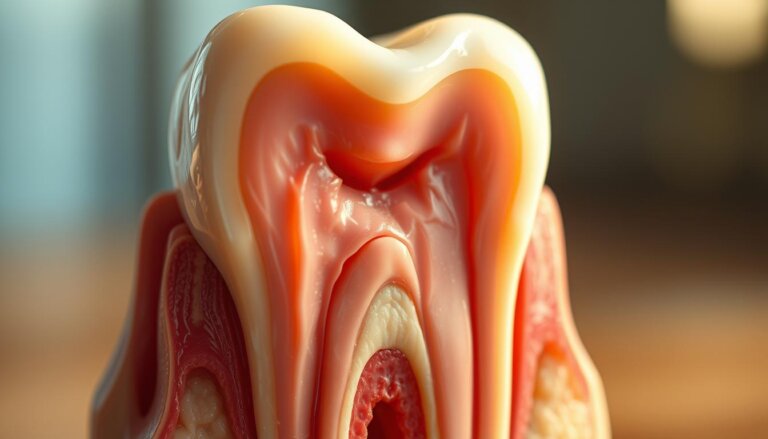Quick Home Remedies for Temporary Toothache Relief
Every year, 2.1 billion people face oral diseases, including toothaches. When this pain hits, many think, “how can I ease a toothache at home temporarily?” Knowing you can’t always see a dentist right away, there are several at-home methods for toothache relief that help until you can get professional treatment.
Natural remedies offer relief, like rinsing with salt water or hydrogen peroxide to fight pain and bacteria. Cold compresses reduce pain and swelling. Ingredients like garlic and vanilla extract use nature’s power to soothe pain. Yet, if toothaches continue, it’s crucial to see a dentist. Home remedies are only short-term solutions for oral health.
Key Takeaways
- Immediate home remedies can provide significant temporary toothache relief.
- Rinsing with salt water is an accessible and effective first-line response to a toothache.
- Cold compress application is a simple technique to reduce pain and swelling.
- Natural ingredients like garlic and vanilla can be used for their medicinal properties to alleviate tooth pain.
- Persistent toothaches require the attention of a dental professional to address the underlying cause.
- Safety first: individuals with special conditions should consult a dentist before trying herbal remedies for toothache relief.
Understanding Toothache Causes
It’s very important to know why toothaches happen, for doctors and everyone else. Toothache causes include problems with tooth and gum structure. Learning about these causes can ease pain and fix the issue for good.
Common dental issues causing toothache
Dental decay is a major reason for tooth pain. It damages the tooth’s hard surface when acid from bacteria eats away at it. This makes sensitive parts of the tooth hurt. If not treated, dental decay could lead to worse problems. It’s important to deal with it quickly.
The role of infections in tooth pain
Infections in the tooth’s center or gums also cause a lot of tooth pain. These are often due to not treating decay or periodontal disease early. Periodontal disease attacks the tissues holding the teeth. Early treatment of infections is key to avoiding more serious dental issues.
| Condition | Symptoms | Typical Causes |
|---|---|---|
| Dental Decay | Persistent toothache, sensitivity to hot and cold | Plaque buildup, sugary diet |
| Periodontal Disease | Red, swollen gums, bleeding during brushing | Poor oral hygiene, smoking |
| Infections | Severe pain, swelling, possibly fever | Untreated cavities, injury |
Initial Steps to Take for Toothache Relief
If you have a toothache, act fast to ease the pain and stop more problems. Use a saltwater rinse and a cold compress for tooth pain for DIY toothache relief. These easy methods offer quick relief and are simple to do, making them great for starting treatment at home.
Using warm salt water to rinse your mouth is a trusted, natural remedy. It can loosen trapped food and lessen swelling. Just dissolve some salt in warm water to make this easy yet helpful oral care solution.
A cold compress applied to the cheek can really help, too. It lowers swelling and numbs the area, making you feel less pain. This works by narrowing blood vessels, which cuts down the pain signals reaching your brain.
| Treatment | Description | Benefits |
|---|---|---|
| Saltwater Rinse | A warm solution of salt dissolved in water used to rinse the mouth. | Cleanses oral wounds, reduces inflammation, and loosens debris. |
| Cold Compress | A cold pack applied externally to the area of pain. | Reduces swelling, numbs the area, and decreases pain. |
These first actions are vital for quick DIY toothache relief and show how easily you can help yourself at first. But remember, they are for short-term relief of mild pain. Always see a healthcare expert if your toothache doesn’t go away or gets worse. This could mean there’s a more serious problem with your teeth.
Over-the-Counter Pain Relievers
When you need quick relief, OTC pain relievers are key for temporary toothache remedies. They not only ease the discomfort but are also easy to get. This makes them great toothache relief options for people of all ages.
The most common OTC pain relievers include ibuprofen and acetaminophen. They are known for their ability to lessen pain and swelling. However, it’s important to stick to the suggested doses to prevent side effects like stomach or liver issues.
| Medication | Use Case | Precautions |
|---|---|---|
| Ibuprofen | Reduces inflammation and pain | Not recommended on an empty stomach |
| Acetaminophen | Lessens pain, minimal anti-inflammatory effects | Liver function must be monitored with prolonged use |
| Aspirin | Reduces inflammation and pain | Should not be used in children or teenagers with viral symptoms |
If a toothache is bad or won’t go away, see a health expert. Using meds for too long, even OTC ones, can harm your health.
Natural Remedies for Toothache
Many people look for home solutions for toothache. Home toothache remedies like clove oil tooth pain relief and garlic as a natural toothache remedy are quite popular. They are favored for their natural sources and effectiveness in easing pain temporarily.
Clove oil is famous for its pain-killing effects. It contains eugenol, which numbs dental pain naturally. To use it, you should put a little diluted clove oil on a cotton ball. Then, place it on the sore spot for quick relief.
Garlic has been a go-to remedy for many health issues for years, including toothaches. Thanks to its antibacterial and anti-inflammatory qualities, it can lessen tooth pain and dental plaque. You can either put crushed garlic on the affected tooth or chew a clove to get its benefits.
| Remedy | Active Ingredient | Properties | Application Method |
|---|---|---|---|
| Clove Oil | Eugenol | Analgesic, Antiseptic | Apply diluted oil on a cotton ball to the affected area |
| Garlic | Allicin | Antibacterial, Anti-inflammatory | Apply crushed garlic or chew slowly |
Although these remedies help with temporary relief, always talk to a healthcare professional for ongoing pain or dental problems.
Herbal Solutions for Temporary Relief
In our world today, modern medicine usually takes the lead. Yet, traditional herbal remedies for toothache still have their place for quick pain relief. These traditional methods, from the calming effects of peppermint to the anti-swelling powers of ginger and turmeric, are all about easing your pain safely and quickly.
Peppermint, especially as tea bags, is famous for its numbing effect that gives instant relief. Putting a warm peppermint tea bag on the sore spot doesn’t just numb the pain. It also uses the herb’s antibacterial traits to fight any mouth bacteria.
Ginger and turmeric paste is another powerful remedy for toothache. This paste combines turmeric’s swelling-reducing power with ginger’s pain-relief abilities. When you put it on your gums, it can lessen swelling and make the pain better.
| Ingredient | Properties | Application |
|---|---|---|
| Peppermint | Numbing and antibacterial | Apply warm tea bags to the affected area |
| Ginger and Turmeric | Anti-inflammatory and pain relief | Massage paste onto gums |
It’s important to say that even though these herbal remedies can help for a while, they don’t replace seeing a dentist. If the pain doesn’t go away, it’s crucial to get help from a dental pro.
Importance of Oral Hygiene
Taking good care of your mouth is key to preventing toothache pain. Everyday habits and consistent care are crucial for keeping your teeth healthy. This prevents painful conditions and helps you stay healthy overall by following good oral hygiene maintenance habits.
When talking about good oral care to prevent toothache pain, it’s essential to focus on everyday dental care routines:
- Brushing teeth twice daily with fluoride toothpaste to reduce plaque build-up and prevent decay.
- Flossing at least once a day to remove food particles and plaque between teeth and under the gum line.
- Using an antibacterial mouthwash to eliminate bacteria that can cause gum disease and oral infections.
Having regular dental check-ups is also a core part of great oral hygiene maintenance. These appointments let your dentist check your dental health, clean your teeth deeply, and give personalized dental care recommendations.
If you’re looking for more advice, here are some dental care recommendations:
| Product Type | Use Case | Benefits |
|---|---|---|
| Fluoride Toothpaste | Daily brushing | Prevents tooth decay and strengthens tooth enamel |
| Dental Floss | Daily use between teeth | Prevents gum disease and cavities between teeth |
| Antibacterial Mouthwash | Use after brushing and flossing | Reduces bacteria, prevents plaque build-up, and freshens breath |
Adding these steps to your daily life builds a strong guard against toothaches and dental issues. This keeps your mouth healthy and happy.
Avoiding Foods That Exacerbate Pain
When you have a toothache, knowing what to eat is key. It helps a lot to follow soft food advice for tooth pain. Avoid foods that make the pain worse.
Eating soft foods eases the pain and helps with healing. Here are some tips on what to eat:
Choosing soft foods and mild flavors helps lessen toothache discomfort.
Avoiding certain foods is important too. Some foods can increase pain or cause harm. This table shows soft foods to eat and foods to stay away from for comfort and health.
| Soft Foods (Recommended) | Foods to Avoid |
|---|---|
| Mashed potatoes | Citrus fruits (like oranges and lemons) |
| Yogurt | Dried fruits |
| Scrambled eggs | Crusty bread |
| Bananas | Hard candies |
| Smooth soups | Sticky foods like caramel |
| Cottage cheese | Very cold or hot foods |
When eating with a toothache, choose foods that are not too hot or cold. Sticking to soft food advice for tooth pain and avoiding hard or acidic foods helps a lot.
Topical Treatments for Tooth Pain
Topical treatments play a big role in managing dental pain quickly. benzocaine for dental pain is known for its fast numbness. It offers quick relief for toothaches. But it should be used carefully because it can cause serious issues like methemoglobinemia.
For those who prefer natural remedies, topical toothache treatments are popular. People make a natural poultice for toothache from home ingredients. Ingredients like guava leaves and wheatgrass help. They reduce pain by fighting germs and swelling.
But remember, benzocaine and natural poultices are for quick relief only. They are not a replacement for a dentist’s care. If your tooth pain lasts or is very bad, you need to see a dentist. These treatments help manage pain until you can get professional help.
Essential Oils for Toothache Relief
Using essential oils for toothache is growing popular thanks to their dental health benefits. Oils like tea tree and oregano stand out for reducing tooth pain naturally. They need to be diluted correctly to be safe and work well.
Tea tree oil benefits are known for dental care. It fights germs that lead to tooth decay and gum disease. It also eases sore gums, making it great for overall oral health.
Oregano oil is praised in dentistry for its strong germ-fighting and antioxidant qualities. It’s great for preventing mouth infections that cause toothaches.
These oils must be mixed with a carrier oil and used with care. You can apply a little on a cotton ball for the sore spot or as a rinse. Always talk to a dentist before regular use to prevent any problems.
When to Seek Professional Help
Knowing when to get professional help for a toothache is key for handling dental pain well. If your toothache won’t go away after trying home remedies, see a dentist soon. We’ll look at important signs that mean you should see a dentist and what happens during the visit.
If you have really bad and ongoing toothache symptoms, don’t wait to get professional advice. Dentists can figure out what’s causing your pain and talk about ways to treat it.
- Severe Pain that doesn’t go away with over-the-counter meds
- Trouble breathing or swallowing, which might mean swelling or infection
- Signs of infection like fever, swelling, or pus
- Clear signs of injury to teeth or jaw
These symptoms all mean you should get professional help for your toothache right away. Waiting could make things worse or lead to bigger health problems.
Signs that indicate it’s time for a dentist visit
Knowing when to see a dentist can ease your pain and prevent serious dental problems. The sooner you go, the better your chances are for a good outcome. If your teeth feel off in any way, it’s time to go to the dentist.
What to expect during a dental consultation
A dentist will thoroughly check your teeth to understand the problem during a consultation. They might take X-rays to see parts of your teeth and jaw that aren’t visible. Based on what they find, they’ll talk about treatments like fixing decay, pulling a tooth, or treating an infection. The goal is to treat the cause of your toothache, get better, and stop future problems.
Though products from the store can help for a little while, seeing a dentist offers complete care and keeps your teeth and gums healthy in the long run. Getting help quickly not only eases the pain but also helps keep your mouth healthy. So, knowing when to see a dentist and making that decision can really make a difference in getting better and keeping your teeth healthy.
Preventative Measures to Avoid Toothaches
Want to prevent toothaches? Start with being proactive about your dental care. This includes regular dental check-ups and fluoride treatments. These steps will improve your oral health. They’ll also make toothaches less frequent and less severe.
Dental visits for check-ups keep your mouth healthy and keep toothaches at bay. By going in for regular check-ups, dentists can spot and treat cavities, gum disease, and other issues early on. This stops them from becoming painful problems later.
The fluoride treatment advantages are many. They help rebuild the tooth enamel, making it harder for decay to set in. Fluoride is also key in fighting off harmful bacteria. This protects your teeth and gums from decay, which is a big cause of toothaches.
| Preventive Measure | Benefits |
|---|---|
| Regular Dental Check-ups | Early detection and treatment of oral issues |
| Fluoride Treatments | Strengthens tooth enamel and protects against decay |
By sticking to a routine that includes regular dental check-ups and fluoride treatments, you can greatly reduce your chances of getting toothaches. This leads to a healthier and more comfortable mouth.
Lifestyle Changes for Dental Health
Making changes in our everyday habits is key to keeping our mouths healthy. This includes what we eat and how we handle stress. Such changes can really make a difference in our dental health.
Eating the right foods is super important for our teeth and gums. Studies show that eating less sugar and more fruits and vegetables helps keep our mouths healthy. Also, cutting down on acidic foods protects our teeth from cavities and decay.
Stress also affects our dental health more than we think. It can cause bruxism, which means we might grind our teeth without realizing it. This can make our teeth wear down and become more sensitive. Reducing stress through mindfulness or exercise is good for our overall and dental health.
- A diet full of calcium and phosphates
- Staying away from sugary snacks and drinks
- Doing activities like yoga or meditation to relax
Bringing these changes into our daily life can make a big difference in how healthy our mouths are. It’s important to look after both our diet and our stress levels. This way, we’re taking a big step towards keeping our teeth healthy for a long time.
Recap of Effective Home Remedies
We’ve looked at many good ways to treat toothaches at home. Quick fixes include rinsing with warm salt water and using a cold compress. Natural remedies like clove oil and garlic have been shown to help because of their pain-relieving and anti-inflammatory properties.
It’s key to remember that these home remedies only offer brief relief. They don’t solve the main problem causing the toothache. Keeping your mouth clean and avoiding certain foods helps. Yet, a dentist’s help is vital for a real solution. Medicine can ease the pain for a while, but seeing a dentist is the best step.
These home treatments are easy to try and can reduce pain fast. But, our main message is to always follow up with a dentist. A lasting toothache can mean serious problems, like infections or tooth decay. Our mission is to work with doctors and patients to stop toothaches before they get worse. Seeing a dentist early on is crucial for your overall dental health.










